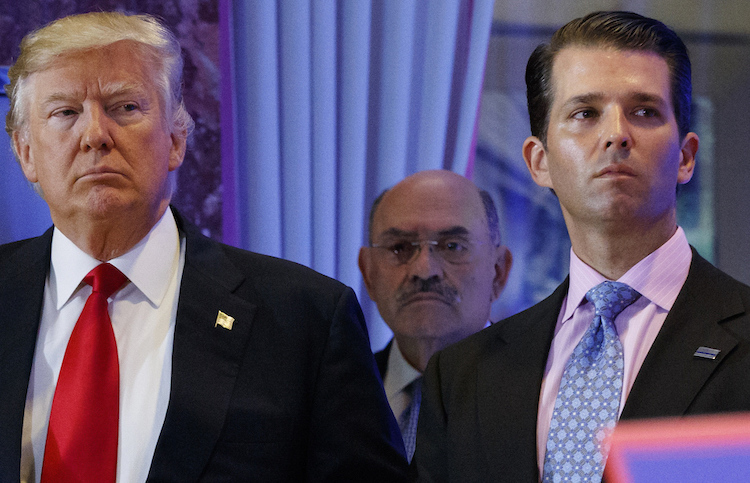Trump Organization says CFO is 'pawn' for politics in criminal prosecution; indictment alleges tax fraud

Then-President-elect Donald Trump, from left, Trump Organization chief financial officer Allen Weisselberg and Donald Trump Jr. during a news conference at Trump Tower in New York on Jan. 11, 2017. Photo by Evan Vucci/The Associated Press.
Updated: The Trump Organization and its chief financial officer, Allen Weisselberg, have been charged with a 15-year scheme to defraud tax authorities by awarding off-the-books compensation to corporate officials.
The indictment obtained by the Manhattan district attorney says Weisselberg, 73, was one of the biggest beneficiaries of the scheme.
The benefits included Weisselberg’s rent-free New York apartment, tuition for private schools attended by his family members, and two leased Mercedes-Benz vehicles, the indictment says.
He is accused of evading more than $550,000 in federal taxes, more than $106,000 in state taxes and more than $238,000 in New York City taxes.
Weisselberg and a lawyer for the Trump Organization pleaded not guilty at an arraignment Thursday afternoon. The charges include tax fraud and falsifying business records.
Reuters, the New York Times and the Washington Post have coverage.
The Trump Organization released this statement: “Allen Weisselberg is a loving and devoted husband, father and grandfather who has worked at the Trump Organization for 48 years. He is now being used by the Manhattan district attorney as a pawn in a scorched-earth attempt to harm the former president. The district attorney is bringing a criminal prosecution involving employee benefits that neither the IRS nor any other district attorney would ever think of bringing. This is not justice; this is politics.”
Trump attorney Ron Fischetti said last week that no company has ever been indicted in connection with failing to pay taxes on employee benefits, according to CNN.
“It’s outrageous. It’s unprecedented. It’s never happened before,” Fischetti said.
The New York Times described Weisselberg as “a man whose unflinching devotion to Mr. Trump will now be put to the test.”
Weisselberg studied finance and accounting at Pace College and began working for former President Donald Trump’s father in 1973, according to the New York Times. Soon, he began working for Trump in his free time until he took on the job full time in 1986.
Weisselberg “had a wide portfolio,” the New York Times reports. “He established an accounting department at the Trump Organization, worked on the financing and management of properties, and helped with the company’s and Mr. Trump’s personal tax returns.”
Weisselberg’s annual compensation from 2011 through 2018 was fixed at $940,000, consisting of $540,000 in base salary and $400,000 in end-of-year bonuses, the indictment says.
A substantial portion of the bonuses paid to Weisselberg and other executives was paid by other Trump Organization entities, including the Trump International Golf Club and the Mar-a-Lago Club, the indictment says.
Bonuses drawn on the other entities were reported as nonemployee compensation, making it possible to report the bonuses as self-employment income. That enabled Weisselberg to make contributions to a tax-deferred Keogh plan available to self-employed individuals.
Weisselberg was known for minimizing and delaying payment to vendors, former Trump executive John Burke told the New York Times.
Former Trump lawyer Michael Cohen went further, saying in his book that Weisselberg and Trump “were like Frick and Frack when it came to stiffing vendors.”
Updated July 1 at 3:04 p.m. to include information from the indictment.



